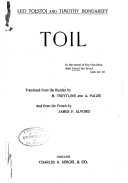Labour or labor may refer to:
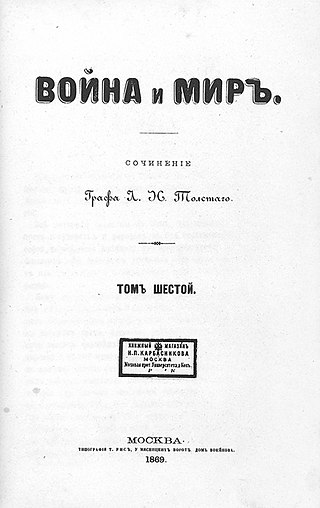
War and Peace is a literary work by the Russian author Lev Tolstoy. Set during the Napoleonic Wars, the work comprises both a fictional narrative and chapters in which Tolstoy discusses history and philosophy. An early version was published serially beginning in 1865, after which the entire book was rewritten and published in 1869. It is regarded, with Anna Karenina, as Tolstoy's finest literary achievement, and it remains an internationally praised classic of world literature.
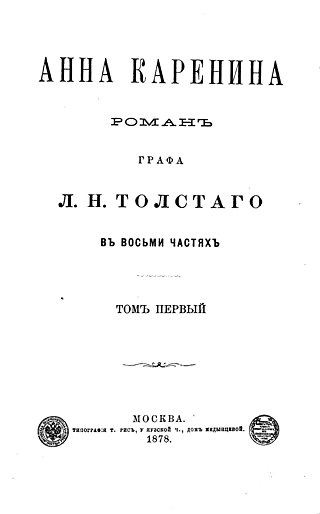
Anna Karenina is a novel by the Russian author Leo Tolstoy, first published in book form in 1878. Tolstoy called it his first true novel. It was initially released in serial installments from 1875 to 1877, all but the last part appearing in the periodical The Russian Messenger. By the time he was finishing up the last installments Tolstoy was in an anguished state of mind and, having come to hate it, finished it unwillingly. When William Faulkner was asked to list what he thought were the three greatest novels, he replied: "Anna Karenina, Anna Karenina, and Anna Karenina".

The Kingdom of God Is Within You is a non-fiction book written by Leo Tolstoy. A Christian anarchist philosophical treatise, the book was first published in Germany in 1894 after being banned in his home country of Russia. It is the culmination of 30 years of Tolstoy's thinking and lays out a new organization for society based on an interpretation of Christianity focusing on universal love.

Yasnaya Polyana is a writer's house museum, the former home of the writer Leo Tolstoy. It is 12 kilometres (7.5 mi) southwest of Tula, Russia, and 200 kilometres (120 mi) from Moscow.
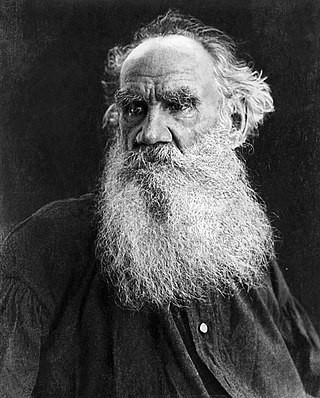
This is a list of works by Russian writer Leo Tolstoy (1828–1910), including his novels, novellas, short stories, fables and parables, plays, and nonfiction.
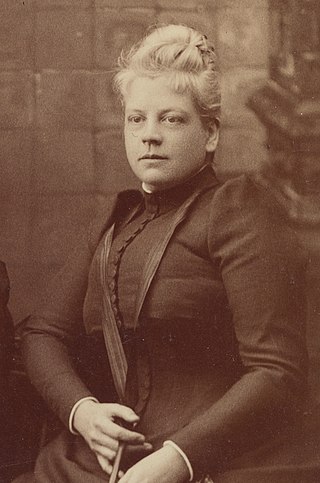
Isabel Florence Hapgood was an American ecumenist, writer, and translator, especially of Russian and French texts.
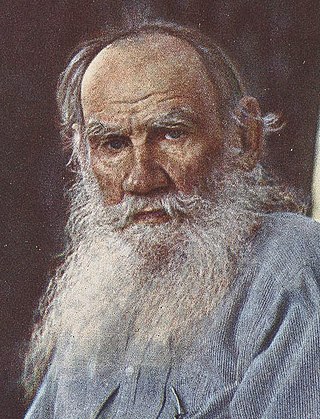
Count Lev Nikolayevich Tolstoy, usually referred to in English as Leo Tolstoy, was a Russian writer. He is regarded as one of the greatest and most influential authors of all time. He received nominations for the Nobel Prize in Literature every year from 1902 to 1906 and for the Nobel Peace Prize in 1901, 1902, and 1909.

Countess Sophia Andreyevna Tolstaya, sometimes anglicised as Sofia Tolstoy, Sophia Tolstoy and Sonya Tolstoy, was a Russian diarist, and the wife of writer Count Leo Tolstoy.
Rosamund Bartlett is a British writer, scholar, lecturer, and translator specializing in Russian literature.
Toil means literally intensive work, and may refer to:
Timofej Mikhailovich Bondarev was a Russian peasant philosopher. He wrote the treatise The Triumph of the Farmer or Industry and Parasitism, which inspired Leo Tolstoy. Tolstoy saw to its publication in 1888 and 1906.

Count Sergei Lvovich Tolstoy was a composer and ethnomusicologist who was among the first Europeans to make an in-depth study of the music of India. He was also an associate of the Sufi mystic, Inayat Khan, and participated in helping the Doukhobors move to Canada.

The Gospel in Brief is a 1892 synthesis of the four gospels of the New Testament into one narrative of the life of Jesus by Russian author Leo Tolstoy.

Olga Lebedeva was a Russian translator, linguist and Orientalist. She was a founder of the Society of Oriental Studies in St Petersburg. Writing as Madame Gülnar, Gülnar Hanım, Gülnar Lebedeva and Olga de Lebedeff, she was one of the first to introduce Russian literature to Turkey. She is recognised for her pioneering contributions to the literary networks between the Ottoman and the Russian empires at the end of the 19th century.
The First Distiller, subtitled How the Imp Earned a Crust, is a play by Leo Tolstoy published in 1886, and translated into English by Aylmer and Louise Maude.
"A Landowner's Morning", also translated as "A Morning of a Landed Proprietor" is a short story by Leo Tolstoy written and published in 1856, early in Tolstoy's career. It is a fragment of Tolstoy's unfinished Novel of a Russian Landowner.
"Evil Allures, But Good Endures" is a short story by Leo Tolstoy written in 1885. It is commonly included in the massively-reproduced collection Twenty-three Tales.

"Thou Shalt Not Kill" is an article by Leo Tolstoy. Written in 1890, it was immediately censored by the Russian censors, and was finally published on August 8, 1900. It is about how rulers, kings, and presidents are murderers for ordering armies to commit murder, and how the assassinations of such rulers should come as no surprise.

"Church and State" is an article by Leo Tolstoy written in 1886. It was translated to English and then published by the anarchist Benjamin Tucker. In this text, Tolstoy condemns anyone who collaborates with the state in committing a war, and especially condemns the Eastern Orthodox Church for supporting the Tsar's wars when Christianity teaches "Thou Shalt Not Kill."
